private void CollectionErrors()
{
Errors.Clear();
if (string.IsNullOrWhiteSpace(NumberProp))
{
Errors.Add(nameof(NumberProp), "This value cannot be empty");
}
else if (decimal.TryParse(NumberProp, out _))
{
Errors.Add(nameof(NumberProp), "NumberProp is not a decimal number!");
}
}
And it is better not to clear all errors completely, but to clear only the error of the checked property:
public Dictionary<string, string> Errors { get; } = new Dictionary<string, string>();
public string this[string propertyName]
{
get
{
CollectionErrors(propertyName);
return Errors.ContainsKey(propertyName) ? Errors[propertyName] : string.Empty;
}
}
private void CollectionErrors(string propertyName)
{
Errors.Remove(propertyName);
if (propertyName == nameof(NumberProp))
{
if (string.IsNullOrWhiteSpace(NumberProp))
{
Errors.Add(nameof(NumberProp), "This value cannot be empty");
}
else if (decimal.TryParse(NumberProp, out _))
{
Errors.Add(nameof(NumberProp), "NumberProp is not a decimal number!");
}
}
}
public string Error => string.Join(Environment.NewLine, Errors.Select(pair => $"[{pair.Key}]=\"{pair.Value}\""));
By convention (contract) INotifyPropertyChanged intreface, the PropertyChanged event should only be raised WHEN the property CHANGES.
Therefore, the correct implementation should be like this:
private double _number;
public double Number
{
get { return _number; }
private set
{
if (Equals(_number, value))
return;
_number = value;
OnPropertyChanged(nameof(Number));
}
}
private string _numberProp;
public string NumberProp
{
get { return _numberProp; }
set
{
if (Equals(_numberProp, value))
return;
_numberProp = value;
OnPropertyChanged(nameof(NumberProp));
if (double.TryParse(value, out double number))
Number = number;
}
}
A complete example of a class implementation with two bound properties.
NumberString - Used to bind to a TextBox.
Number - Contains the value of the NumberString property converted to double.
Error checking is implemented for both properties.
Also notice the [CallerMemberName] attribute.
It allows you not to specify the property name in the methods.
public class Data : INotifyPropertyChanged, IDataErrorInfo
{
public event PropertyChangedEventHandler PropertyChanged;
private void OnPropertyChanged([CallerMemberName] string propertyName = null)
=> PropertyChanged?.Invoke(this, new PropertyChangedEventArgs(propertyName));
private double _number;
public double Number
{
get { return _number; }
private set
{
if (Equals(_number, value))
return;
_number = value;
CollectionErrors();
OnPropertyChanged();
}
}
private string _numberProp;
public string NumberProp
{
get { return _numberProp; }
set
{
if (Equals(_numberProp, value))
return;
_numberProp = value;
CollectionErrors();
OnPropertyChanged();
if (double.TryParse(value, out double number))
Number = number;
}
}
public Dictionary<string, string> Errors { get; } = new Dictionary<string, string>();
public string this[string propertyName] => Errors[propertyName];
private void CollectionErrors([CallerMemberName] string propertyName = null)
{
if (propertyName == null)
return;
Errors.Remove(propertyName);
if (propertyName == nameof(NumberProp))
{
if (string.IsNullOrWhiteSpace(NumberProp))
{
Errors[nameof(NumberProp)] = "This value cannot be empty";
}
else if (decimal.TryParse(NumberProp, out _))
{
Errors[nameof(NumberProp)] = "NumberProp is not a decimal number!";
}
}
else if (propertyName == nameof(Number))
{
if (Number < 0 || Number > 1000)
Errors[nameof(Number)] = "The number must be in the range 0 ... 1000!";
}
}
public string Error => string.Join(Environment.NewLine, Errors.Select(pair => $"[{pair.Key}]=\"{pair.Value}\""));
}


